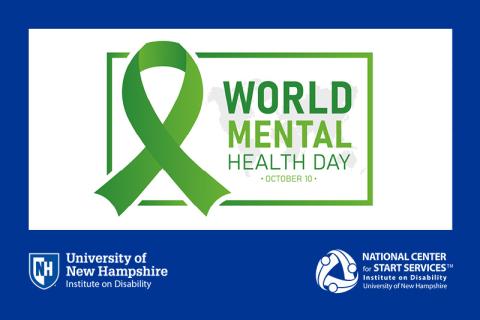
World Mental Health Day is October 10. According to the World Health Organization, this day is an opportunity for people and communities to unite behind the theme "mental health is a universal human right." Mental health is a basic right for all people, including persons with intellectual and developmental disabilities (IDD). As part of the Institute on Disability at the University of New Hampshire, the National Center for START ServicesTM focuses on improving mental health for people with IDD in several ways. In addition to accessible and appropriate clinical treatment, we also focus on nurturing individual strengths and increasing social connection. This approach can benefit mental health for everyone!
In observance of World Mental Health Day, we're sharing the following Frequently Asked Questions about mental health in people with IDD.
Do people with IDD experience mental health issues?
People with IDD can experience the same mental health conditions as neurotypical people. In fact, psychiatric disorders occur at a higher rate in people with IDD. Estimates of psychiatric disorders in people with IDD range from 25% to 55%.
What are the most common psychiatric issues in people with IDD?
Depression and anxiety disorders are the most common, just as they are in the neurotypical population. Trauma related disorders are also common. Unfortunately, people with IDD often are undiagnosed or misdiagnosed. There tends to be overdiagnoses of schizophrenia and bipolar disorder.
What are some of the challenges in making accurate diagnosis in people with IDD?
There are several factors. One of the most common issues is the concept of ‘diagnostic overshadowing’. This is the tendency to attribute presenting issues to IDD as opposed to seeing them as symptoms or signs of a psychiatric disorder. For example, someone’s refusal to participate in activities is more likely to be seen as ‘non-compliance’ than as withdrawal/loss of interest due to depression.
What can we do promote mental health and mental wellness in people with IDD?
Focusing on strengths and increasing social connection and belonging go a long way toward preventing and treating the most common mental health issues. Accurate diagnoses and access to appropriate treatment are critical issues for people with IDD.
Source
Fletcher, R. J., Barnhill, J., & Cooper, S.-A. (2018). DM-ID-2: Diagnostic Manual, intellectual disability: A textbook of diagnosis of mental disorders in persons with intellectual disability. NADD Press.


